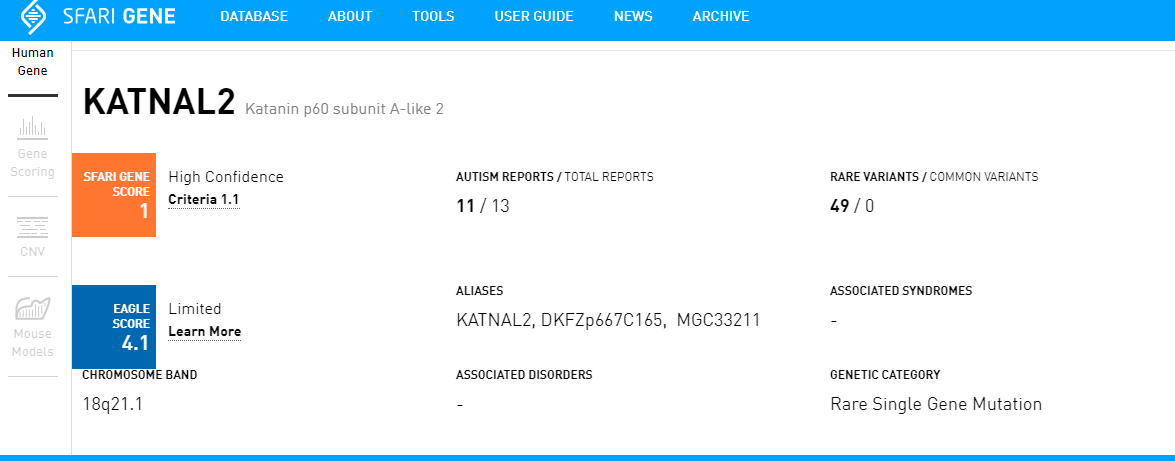New precision medicine scoring system evaluates whether genes are related to autism spectrum disorder
Summary:
EAGLE allows for a more precise evaluation of a gene’s relevance to ASD specifically, based on quality of phenotypic and genotypic evidence, and is now publicly available to researchers and clinicians on SFARI Gene.
A new gene scoring system developed by a multidisciplinary group of international experts, led by researchers from The Hospital for Sick Children (SickKids), is providing more insight into understanding which genes may be involved in autism spectrum disorder (ASD).
EAGLE (Evaluation of Autism Gene Link Evidence) is a gene scoring framework that expands on existing frameworks to provide researchers and clinicians with a more comprehensive assessment tool to evaluate evidence for a gene’s association specifically with ASD, rather than a broad range of neurodevelopmental disorders. EAGLE launched today and is now available on SFARI Gene, an online database of genes implicated in autism.
ASD refers to a group of neurodevelopmental conditions resulting in challenges related to social communication and behaviour. Typically defined through a behavioural diagnosis, researchers have shown contributing genetic variants in individuals with ASD. However, the expert group says existing scoring systems have traditionally focused on a broad range of neurodevelopmental phenotypes.
The international group of ASD and clinical genetics experts, led by Drs. Stephen Scherer and Jacob Vorstman at SickKids and Dr. Christian Schaaf at Heidelberg University in Germany, aimed to provide a rigorous approach for evaluating the strength of evidence supporting a gene’s relevance specifically to ASD that considers both phenotype and genotype associations.
“With EAGLE, we are providing a focused framework for curating ASD-relevant genes, which may be valuable for patient care, especially for those with other conditions such as epilepsy. EAGLE will also help to focus research for variants and increase efficiency of sequencing analysis,” says Dr. Stephen Scherer, one of the creators of EAGLE and Chief of Research at SickKids. “Our ability to better analyze and act on genomics findings is an integral part of SickKids’ Precision Child Health approach to provide individualized care to all children. EAGLE is an important step in helping us better understand the genetic underpinnings of ASD.”
Outlined in a Nature Reviews Genetics publication in 2020, EAGLE was designed specifically to assess associations with ASD, building off existing standardized gene evaluation methods like the Clinical Genome (ClinGen) Gene-Disease Validity framework. It includes evaluation of genetic and phenotypic evidence, including the confidence level of an ASD diagnosis as well as information on the cognitive ability of the patient.
“While we realize that thus far no gene is associated with autism alone, knowledge of a gene’s relationship with the ASD phenotype specifically will allow for clinical laboratories to better prioritize genes and for health-care providers to interpret genomic tests with more confidence,” says Schaaf, Chairman and Director of the Institute for Human Genetics at Heidelberg University.

To date, 150 genes have been evaluated for their connection to ASD under the EAGLE framework. An EAGLE score will eventually accompany each gene in the SFARI Gene database, with collaborative efforts to score each gene being performed by Olivia Rennie, Associate Research Technologist at SickKids and medical student at the University of Toronto, and Ny Hoang, a Genetic Counsellor in the Division of Clinical and Metabolic Genetics at SickKids.
Vorstman, a Child and Adolescent Psychiatrist and Director of the Autism Research Unit at SickKids notes: “We’ve already identified discrepancies with existing gene lists for the initial 150 genes we’ve evaluated with EAGLE, highlighting that among existing frameworks, association evidence often relies on a mixture of neurodevelopmental disorders including, but not specific to, ASD. With EAGLE, we are not replacing a behavioural diagnosis, but drilling more precisely into the evidence to provide researchers and clinicians a list of genes for which the association of evidence is curated specifically for ASD.”
Learn more about EAGLE on the SFARI website and view EAGLE scores on the SFARI Gene website.

